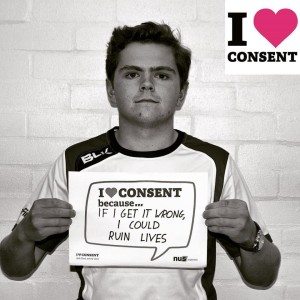Comment Corner: Standing up to the stigma: Why sports clubs should heart consent
I’ve come to learn that when I go out to a nightclub, I should expect sexual advances
[dropcap]O[/dropcap]n Tuesday 20 October the Warwick Uni Men’s Hockey Club co-hosted an ‘I Heart Consent’ workshop with our sister club, the UWLHC. The quote you have just read is the sole statement from that workshop that has imprinted itself so vividly in my mind. Given the recent coverage in the media of the somewhat narcissistic, antiquated views of a certain ‘he who must not be named’, I felt compelled to get the club involved. I felt the need to help educate those who wanted to learn more. I for one certainly would have benefited from these sessions in my first year. As we ploughed through the workshop one thing became strikingly clear. Behind every anecdote, every opinion, and every discussion, there was a common thread: The “lad-culture” stereotype. Like it or not, it’s here, it exists, and it’s a very real problem not just at Warwick but at every UK university.
As a longstanding member of one of Warwick’s largest sports clubs, I take it somewhat personally that so many of us (not only males) are labelled with the sports player stereotype as sex-crazed, lager drinking misogynists, which is clearly untrue. However, I do accept the fact that unacceptable sexual behaviour behind the mask of supposed “banter” happens way too often on University campuses. Hence, it was unsurprising that when asked to discuss their previous education regarding sexual relations and consent, attendee’s responses consisted largely of cringe worthy, dated videos from their year 6 biology lessons and next to no education at all regarding consent.
This ‘sport-specific’ workshop we helped co-ordinate looked to address the lad culture stereotype, and fill these gaps in peoples’ knowledge that seemed so prevalent. As hockey clubs, we sought to educate our members on the importance of relationships at university, including potential pitfalls and the legal and ethical implications of getting it wrong. Although, it’s easy to lay the blame for sexual harassment and violence at the door of those with a Y chromosome, the event enabled us to look at instances in which both genders were at fault.
The “lad-culture” stereotype. Like it or not, it’s here, it exists, and it’s a very real problem not just at Warwick but at every UK university.
A chance for some frank and honest discussion, the workshop was a great success. Feedback was incredibly positive, with many who attended indicating that they felt better prepared to monitor their actions in public, with a heightened awareness of consensual behaviour. This is only a step, but maybe we can finally move towards destroying the stigma that surrounds our sports clubs.


Comments (1)
I’m genuinely saddened that UWMHC chose to post these ‘I love consent’ photos on their social media. I’m afraid it’s a case of good intentions but not a lot of thought.
Of course education about consent is important. People particularly need to be aware of certain scenarios that might seem consensual but aren’t, and everyone should be aware of the effects of sexual harassment, sexual assault and rape on victims’ lives. Schools should really be doing a lot more to address this, to which, in fairness, the article does allude.
The social media campaign, however, couldn’t be more misguided. It’s terribly fashionable nowadays to post photos of yourself on Facebook, Twitter and Instagram to show you support a certain cause. But what effect does holding a sign and exclaiming that you love consent actually have?
It’s certainly not educating anyone. Most of the messages didn’t even make sense, e.g. ‘I love consent because I’m not ashamed to say so’ and ‘I love consent because it’s ok to say no’, neither of which actually explain why the sign-holder loves consent. Hold a workshop by all means, but these are empty messages of no effect, rather like many similar social media ‘campaigns’.
The actual effect of these photos is to confirm the stereotype that most university sportsmen really couldn’t care less if a woman says ‘no’. Yes, I understand they’re holding signs saying they love consent, but that’s precisely the point. Can’t we safely assume most of these men aren’t rapists without them declaring so on a sign? Can’t we safely assume most of them enjoy consensual sex, as opposed to raping women?
Having the Executive Committee of UWMHC hold these signs against a brick wall (ironically, each photo resembling a mugshot) is as ludicrous as encouraging peaceful, law-abiding Muslims to hold signs proclaiming, ‘I am not a terrorist’. In fact, the only plausible scenario in which the latter would happen is in a campaign challenging prejudices about all Muslims being terrorists. In contrast, UWMHC’s photos aren’t intended to challenge the stereotype about university sportsmen being rapists.
I don’t doubt the Club’s good intentions, but, once again, education is key; vacuous social media campaigns that do nothing to educate people about consent and reinforce negative stereotypes are not.